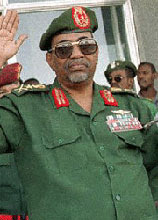
Sometimes, I really think that Americans take their security and safety for granted. Just think of all the consumers who will complain about rising prices at the gas station or the supermarket, but for the most part, they remain able to do so without fear of a terrorist attack.
On Tuesday, a series of devastating bomb blasts ripped through several crowded markets and Hindu Temples in the Indian city of Jaipur, killing or wounding hundreds of people.
From the
BBC:
At least 60 people have been killed and more than 150 wounded after a series of bomb blasts tore through the city of Jaipur in western India, officials say.
The bombs went off near historic monuments in the crowded old city at one of the busiest times of the day.
The head of state police said it was a terrorist attack. Reports suggest the death toll could rise.
Jaipur, in Rajasthan, is a popular tourist destination about 260km (160 miles) from the Indian capital, Delhi.
No group has admitted planting bombs in Jaipur. It is not yet clear what the motive for attacking the city might be.
Most people in Jaipur are Hindus but the city has a large Muslim minority. Correspondents say it has no history of religious violence.
In the 6 years since 9/11, the United States has been spared the brutal wrath of terrorism...enough time to allow it to become a political punchline at times, mainly among the anti-Bush factions who believe that the president's policies are the biggest threat to global stability. Does anyone remember the movie "Fahrenheit 9/11", where Michael Moore suggests that the terrorist threat is overblown and is being exploited by the Bush Administration? In the months and years that followed that movie, we have seen terrorists blow up commuter trains in the bowels of London, execute school children in Russia, detonate wedding
parties in Iraq and Jordan, assassinate leaders in Lebanon and Pakistan, repeatedly decimate cities in Algeria, and target cafes in Israel...the list goes on. Almost on a daily basis, political extremists are taking more and more victims.
But it is not only comments that come from the American left and the so-called "antiwar" movement I take issue with. I often see conservative commentators and Republicans saying the same old phrase "Its better to fight them over there than over here". To me, that is a really dumb phrase, because the entire world is in this together. This is not only an issue of "national security". The one group that has been singled out as the source behind much of the terrorism in the world--Muslims--have also been the biggest victims. Sure, Al-Qaeda and the Takfiri extremists take victims in all forms--they may be westerners, Hindus, or Jews, but more often than not, Muslims continue to be targeted the most. The fact that Muslims have taken the brunt of terrorist violence certainly puts a dent in the beliefs of televangelists like
Rod Parsley who claim that Islam is an "evil" religion seeking to topple western civilization.
Showing gratitudeInstead of viewing countries like Iraq, Pakistan, and Afghanistan as the proverbial "over there" some political leaders speak of, we should show tremendous respect to the people of those countries for fighting terrorism...right in their own backyard. While Americans go out shopping with the biggest worry of how much they can spend, Iraqis, Afghans, and others who live "over there" have to do so while fearing for their lives.
Sometimes though, they are not given the respect they deserve. The so-called "antiwar" movement repeatedly downplays the reality that Al-Qaeda is indeed operating inside of Iraq and targeting innocent people in its campaign of mass murder. Instead, they would like to present to the American people (or as they see it, potential voters) that the current fighting is only about ancient hatred, and that Iraqis are lusting for each others' blood and unable to put their country back together. The Iraqi Security Forces are
portrayed as incompetent and incapable of handling operations on their own, even as they are bravely fighting against terrorism (in their own country) and taking losses much higher than their American counterparts.
I suggest we show a little more appreciation...and respect. Just because the terror attacks that are wrecking havoc across the globe have not found their way into the streets of an American city these last few years does not mean we should forget about it. Our allies and friends, as well as those who are determined to make the world a more dangerous place are fully participating...and Americans should be as well.













